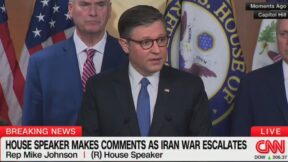‘Tipping Point Moment’: Fareed Zakaria Praised For Monologue Blasting ‘Elite Universities,’ Urging Them to Abandon Politics
CNN’s Fareed Zakaria went viral over the weekend with his Sunday monologue slamming American universities for prioritizing “pushing political agendas” over pursuing academic excellence found praise among many on the right and the left as well.
“Three university presidents came under fire this week for their vague and indecisive answers when asked whether calling for the genocide of Jews would violate their institution’s codes of conduct. But to understand their performance, we have to understand the broad shift that has taken place at elite universities, which have gone from being centers of excellence to institutions pushing political agendas. People sense the transformation,” Zakaria began.
Zakaria made his comments after U Penn President Lizz Magill had already resigned under pressure over her comments and Harvard President Claudine Gay had apologized amid calls for her resignation. MIT President Sally Kornbluth, the third president to testify before Congress, received the backing of her university’s board and seems likely to weather the storm.
Zakaria continued by noting some polling data showing fewer Americans valuing prestigious college degrees than in years past.
“This souring on higher education makes America an outlier among all advanced nations,” he argued, adding:
American universities have been neglecting a core focus on excellence in order to pursue a variety of agendas, many of them clustered around diversity and inclusion. It started with the best of intentions. Colleges wanted to make sure young people of all backgrounds had access to higher education and felt comfortable on campus. But those good intentions have morphed into a dogmatic ideology and turn these universities into places where the pervasive goals of political and social engineering, not academic merit.
As the evidence produced for the recent Supreme Court case on affirmative action showed, universities have systematically downplayed merit based criteria for admissions in favor of racial quotas. Some universities’ response to this ruling seems to be that they will go further down this path, eliminating the requirement for any standardized tests like the SAT. That move would allow them to then take students with little reference to objective criteria. Of course, those who would suffer most would be bright students from poor backgrounds who normally use tests like PSAT to demonstrate their qualifications.
In the humanities hiring for new academic positions now appears to center on the race and gender of the applicant, as well as the subject matter, which needs to be about marginalized groups. A white man studying the American presidency does not have a prayer of getting tenure at a major history department.
“The most obvious lack of diversity at universities, political diversity, which clearly affects their ability to analyze many issues, is never addressed,” Zakaria continued after further blasting the bureaucracy committed to “diversity, equity and inclusion” on campus.
“Out of this culture of diversity has grown the collection of ideas and practices that we have now all heard of: safe spaces, trigger warnings, microaggressions,” he continued, adding:
The Jewish groups would wonder why do safe spaces, microaggressions and hate speech not apply to us? If universities can take positions against free speech to make some groups feel safe, why not us? Having coddled so many student groups for so long, university administrators found themselves squirming, unable to explain why certain groups Jews, Asians don’t seem to count in these conversations. Having gone so far down the ideological path, these universities and these presidents could not make the case clearly that at the center of a university is the free expression of ideas, and that while harassment and intimidation would not be tolerated, offensive speech would and should be protected.
“America’s top colleges are no longer seen as bastions of excellence but partisan outfits, which means they will keep getting buffeted by these political storms as they emerge. They should abandon this long misadventure into politics, retrain their gaze on their core strengths, and rebuild their reputations as centers of research and learning,” Zakaria concluded.
The monologue was shared on X/Twitter and received praise from leaders as diverse as Elon Musk and Jeremy Ben-Ami – the president of J-Street, which is the left’s foil to AIPAC. Josh Kraushaar, the editor-in-chief of Jewish Insider, called Zakaria’s comments a “Tipping point moment,” while Spencer Cox, the Republican governor of Utah, called them, “Brilliantly stated.”
__
New: The Mediaite One-Sheet "Newsletter of Newsletters"
Your daily summary and analysis of what the many, many media newsletters are saying and reporting. Subscribe now!






Comments
↓ Scroll down for comments ↓